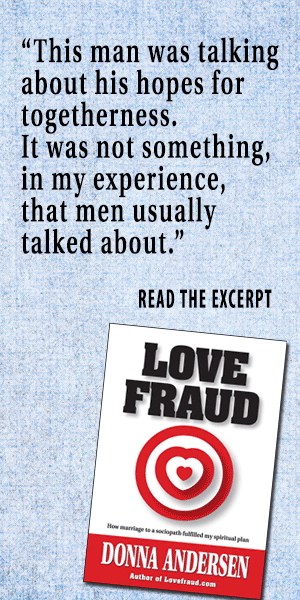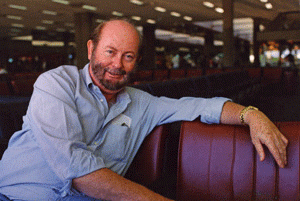Next month brings Valentine’s Day, when the whole world focuses on love. But for many of us who have had our hearts broken by sociopaths, Valentine’s Day may bring more pain than pleasure.
I want you to know that there can be love after the sociopath, and I am living proof. My story, which I wrote in my first book, Love Fraud — How marriage to a sociopath fulfilled my spiritual plan, is ultimately a story of triumph — heartbreak, then recovery, then the wonderful happy ending. I previously published excerpts describing the betrayal by my ex-husband. The first installment is below — follow the links to read all of them. Next, I’ll publish excerpts of my healing journey.
In a Valentine’s Day special, I’m offering you an autographed copy of the original printed book for the very low price of $4.99, plus shipping. Enjoy! And be inspired! Buy now.
 By Donna Andersen
By Donna Andersen
I met James Montgomery online in 1996. Although he was originally from Sydney, Australia, he moved to New Jersey and lived about a half-hour from my home. After corresponding for a month, we met for breakfast:
My scrambled eggs arrived—James only ordered coffee. “So you’ve worked in Hollywood?” I asked.
“Yes, I was one of the founders of the cable channel, Movietime. Later the channel was sold to Time Warner and became E! Entertainment Television. When I was there, our concept was to make Movietime interactive. But this was back in the late ’80s—we were ahead of our time.
“I also did some screenwriting—I have credits for Crocodile Dundee II. The Crocodile Dundee movies were based on skits we wrote for an Australian TV show. You remember the part where Paul Hogan runs into a hood in New York who pulls a switchblade on him? And then Paul Hogan pulls out his big hunting knife, and says, ‘No, this is a knife.’ Well, that was all done before on the TV show.”
“It was funny,” I said, impressed that he wrote the gag.
“It was old,” James said disparagingly. “Nothing new. The whole movie was a typical fish-out-of-water story.”
James poured cream and three packages of Sweet ’n’ Low into his coffee. Then, stirring the coffee, he continued. “The last big project I did was the bible for Star Trek Voyager.”
“A bible? What’s that?”
“It tells the basic premise of the show, what we call the backstory. It defines the characters, tells their history, establishes the situation they are in. For example, it says that Voyager is lost in an unknown, distant part of the galaxy, and the crew’s objective is to find its way home. One of the things they wanted was that the captain would be a woman. So I created Kathryn Janeway. And she is the captain, there’s nothing to convey she’s a token woman in the job.”
“That’s pretty cool. I like Star Trek.”

James made a face. “It’s not real science fiction—it’s Wagon Train,” he said, with a dismissive gesture. “It’s such a formula. Something bad happens, they circle the wagons, and in the last 15 minutes of the show, everything is resolved.”
“Well, I still like it. Although I like the new shows better than the old ones. Are you still doing it?”
“No, and my agent—he’s one of the best in the business—is mad at me. When I write, he makes money. But now I’m working on theme parks.”
“Is that what you’re bringing to Atlantic City?”
This was obviously the question James was waiting for. “Yes—I’m developing an LBE—which means location-based entertainment—called CelebAM,” he enthusiastically explained. “That’s short for Celebrate America. It’s a brand-new entertainment concept, targeted toward older demographics—the people who visit Atlantic City. It will be an electronic, interactive museum, mixing virtual reality with live presenters.
“CelebAM will have three wings—the Golden Years of Hollywood, the Medal of Honor Hall of Heroes, and the Atlantic City Hall of Fame, with ‘boxing and beauties.’ We already have most of the materiel for the museum. We own a collection of original Hollywood costumes, like the dress Julie Andrews wore in The Sound of Music. We have exclusive rights to film and video from the Congressional Medal of Honor Society. And we have the rights to the biggest private boxing collection in the world.”
After a sip of coffee, James continued. “Another part of CelebAM is called Cyberia. That’s where we’ll have the virtual reality, but it’s not shoot ’em up kids’ games; it’s geared for adults. We’ll have 100 two-person pods. People will be able to sit in them and feel like they’re flying a helicopter to Cape May or Philadelphia or New York. They’ll see the ground below—except the year may be 1492. That’s what you can do with virtual reality software; you can make anything. And when they’re finished, they can buy a personalized VHS tape of their ride.”
James’ concept struck me as truly innovative. “How long have you been working on this?” I asked.
“I put four years into CelebAM down in Tampa,” James replied. “We had agreements with simulator companies and architectural renderings for the building. Then last year we lost our land to the Tampa Port Authority—they took it through eminent domain to build a cruise ship terminal.”
“What did you do then?”
“About that time I got a call to look at some electronic simulation. So I came to Atlantic City for 10 days and never left. I realized with CelebAM’s over-50 market target, Atlantic City was a perfect place for it. Thirty-six million people a year visit Atlantic City. Once they walk out of a casino, there really isn’t anything for them to do.”
“That’s true,” I said. “For a long time, the casinos really didn’t care if there was anything else here for people to do. In fact, for the first 10 or 15 years, they wanted nothing to do with family entertainment. The thinking was, kids can’t gamble, so why attract kids? But now that gambling is legal in other areas of the country, like the riverboats and Indian casinos, people in Atlantic City realize they have to make the town more of a destination resort.”
“Exactly,” James said. “So I’ve been talking to the ACCA—the Atlantic City Convention Authority—about the old Convention Hall.”
Atlantic City’s original Convention Hall opened on the Boardwalk in 1929. At the time, it was the world’s first and largest full-service convention facility. But a new, state-of-the-art convention center was under construction at the foot of the Atlantic City Expressway—the highway that linked Atlantic City to Philadelphia and the rest of the world. The local powers-that-be had not yet determined what would become of the old hall once the new one opened.
“I had a deal to put CelebAM in the front section of the building,” James said. “The head guy loved the CelebAM concept. I was ready to start construction, and he was fired. My deal went down the tubes.”
“So what are you going to do?” I asked.
“I have to start selling the idea all over again,” James said. “The problem is, with the boss gone, no one really knows who is in charge.”
James took another sip of his coffee. “Gale was an engineer, you know. She was working with me on the project.”
“When did she die?” I asked.
James hesitated. Then he answered, “Four months ago.”
I sat back in the booth—this was not the answer I expected. “That’s too soon,” I said quickly. “You can’t be ready to get involved again.”
James looked at me, and I could see sadness in his eyes. “I’ve lost a lot of people,” he said quietly. “Many good friends in Vietnam. And those who survived the war are now dying from cancer because of the chemicals. I lost my father last year. I’ve learned that I have to get over it quickly and move on.
“Gale was young, but her family had a history of heart problems, and she smoked. She had a heart attack in our home—I was there when it happened. I called 911. Then I tried to give her CPR. I picked her up—there’s a way that a body feels when it’s dead; it’s heavier than when a person is alive. That’s how she felt.”
“But four months,” I protested. “You can’t possibly be over it already.”
James paused. “I took some time and went to Australia to be with my daughter and grandchildren,” he said. “But I have to move on. Gale would want me to.”
Unconvinced, I looked down and grasped my coffee mug with two hands, making sounds which, roughly translated, meant, I don’t think so.
“I’m talking myself out of this, aren’t I,” James said softly.
Glancing up, I asked almost flippantly, “Why, do you think we have a chance?”
He looked deep into my eyes with a mixture of sincerity and wistfulness. “Yes,” was his barely audible answer. “I do.”
I was silent, but my mind was racing. Physically, this man was not at all what I wanted. He was out of shape, older than me and probably would have flunked my compatibility quiz. But the words of the first psychic I ever visited echoed in my head: “Love is a choice.” The admonition meant that we can spend our entire lives waiting for Mr. or Ms. Right to come along, or we can choose to love the person who stands before us. This man was talking about his hopes for togetherness. It was not something, in my experience, that men usually talked about.
Well, James was intelligent, successful, ambitious and willing to love again. The least I could do was give him a chance.
Next: Was the relationship moving too fast, or was I just afraid?




































 Letting go of the mistake with the sociopath
Letting go of the mistake with the sociopath